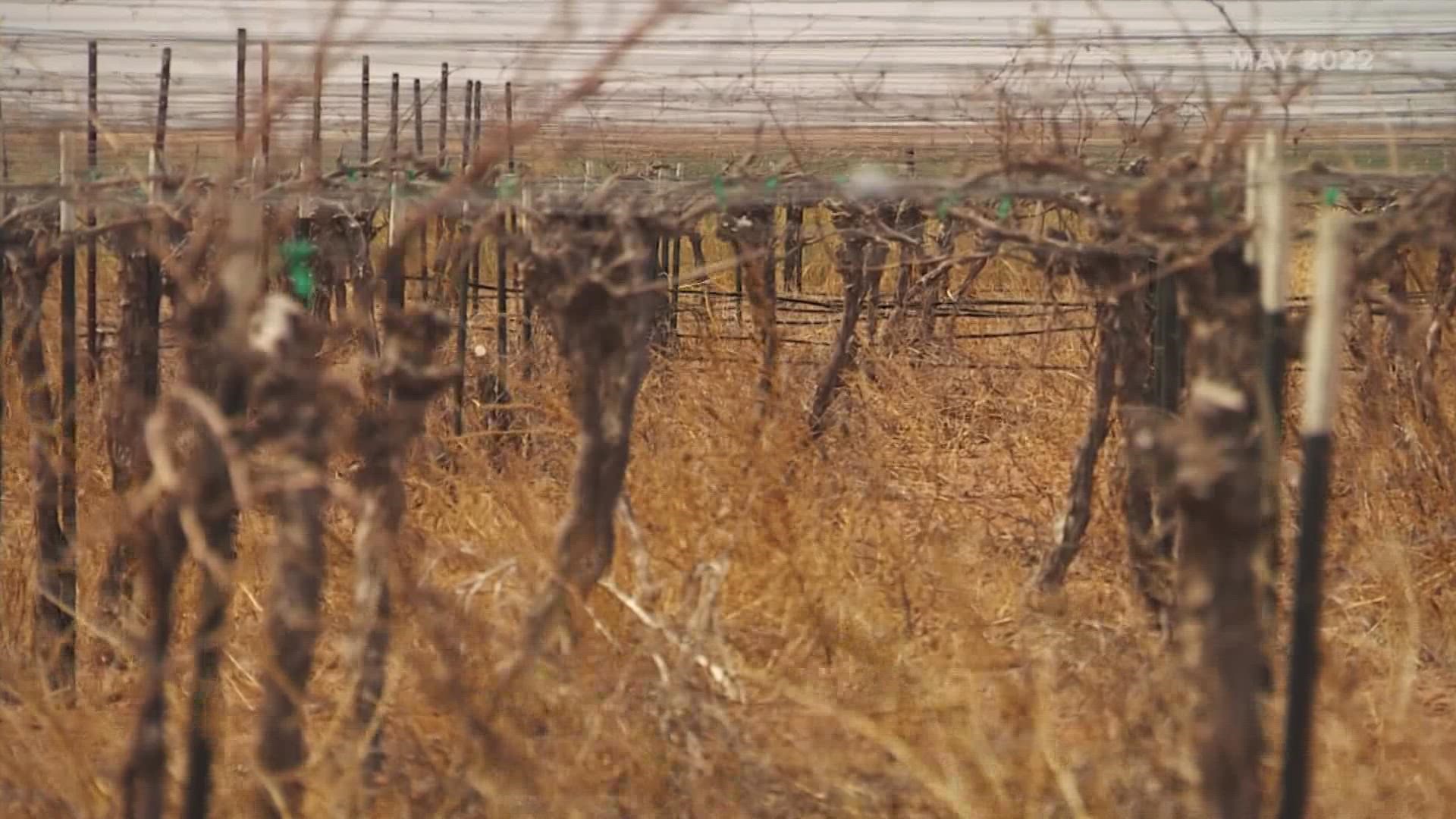LUBBOCK, Texas — Texas grape growers believe herbicide carried through the air from nearby cotton farms is killing their crops.
"Look at these next plants. You know how dead that is?"
It's just one more dead viognier vine for grape grower Cliff Bingham, the owner of Bingham Family Vineyards.
His vineyard on a back dusty road in the high plains of Texas was his dream, along with the tasting room he has down in Fredericksburg.
"You see that main trunk, it's dead," Bingham said.
Andy Timmons had that same dream - a tasting room in Fredericksburg, and up in Lubbock, 20 acres of grape vines wind around his home.
"But what we're dealing with now is not of mother nature," said Timmons, the owner of Lost Draw Vineyards. "I put everything that I have into these vineyards."
Timmons uses nets to block the hail and wind machines to fend off a freeze but says what's killing his vines today was made in a lab.
"I would guess 60-75% of the cotton in the High Plains is using that type of technology," Timmons said.
Timmons and Bingham believe an herbicide called dicamba, which is used to protect cotton from weeds, is to blame. The herbicide isn't used on their vineyards, but they believe it's drifting through the air from cotton farms miles away.
"It's not just one little area. It's spread out all over the place," Timmons said.
The debate over dicamba usage goes beyond Texas.
"It's been a long five years of my life, let's put it that way," said Aaron Hager, an associate professor of Extension Weed Science at the University of Illinois.
Hager says while dicamba is an important tool for so many farmers, he says it's been an issue.
"It's affected literally millions of acres," Hager said.
In Illinois, he says instead of grapes versus cotton, it's soybean farmers versus soybean farmers - those who use the dicamba-resistant seeds versus those who don't.
"It's not a question of if you're going to see soybean injury. The question we have going into each growing season is - how extensive is it going to be this year?" Hager said.
Now, 57 growers in the High Plains believe that dicamba has damaged their vines and future ability to grow grapes. In response, they're suing Bayer and BASF, who make the products, for $560 million.
The growers say the biggest sign of damage to their plants leaves being smaller. Smaller leaves aren't as good a protecting grapes and preventing them from blistering in the sun.
"What you see in the photos, what you see in the videos, are unique symptoms to dicamba. The leaves start to cup, and they stop growing," said Adam Dinnell, a partner with Schiffer Hicks Johnson, PLLC.
The companies chose to not talk to us about the lawsuit, but issued the following statements:
Bayer Statement:
"We have great sympathy for any grower who suffers a crop loss, but there are many possible reasons why crop losses might occur that a number of these plaintiffs have acknowledged, including extreme winter weather conditions and other herbicides used off label that can have harmful effects on perennial crops like vineyards.
“Bayer stands strongly behind the safety and utility of our XtendiMax™ herbicide and has continued to enhance training and education efforts to help further ensure growers can use these products successfully.
“XtendiMax™ is a valuable tool for growers, especially at a time when they need more options to tackle increased weed resistance. We are proud of our role in bringing innovations like XtendiMax™ forward to help growers safely, successfully, and sustainably protect their crops from weeds.”
BASF Statement:
"BASF is aware of the lawsuit filed in Texas on June 4, 2021, by grape farmers, alleging dicamba damage to their vineyards. BASF has had the opportunity to review these claims and the alleged damage and strongly disagrees with the allegations in the lawsuit. It is well documented that a 2019 freeze contributed significantly to the grower’s current complaints and that other known sources of herbicides, such as applications to public rights of way, have been ignored by the growers."
But no matter the cause, damaged grapes are hurting growers.
"Without the High Plains, there's no Texas grapes. And without Texas grapes, there's no Texas wine," Dinnell said.
As the sun sets on a field of uncertainty, the farmers are praying for hope on the horizon.
"We're just trying to save ourselves," Timmons said.

